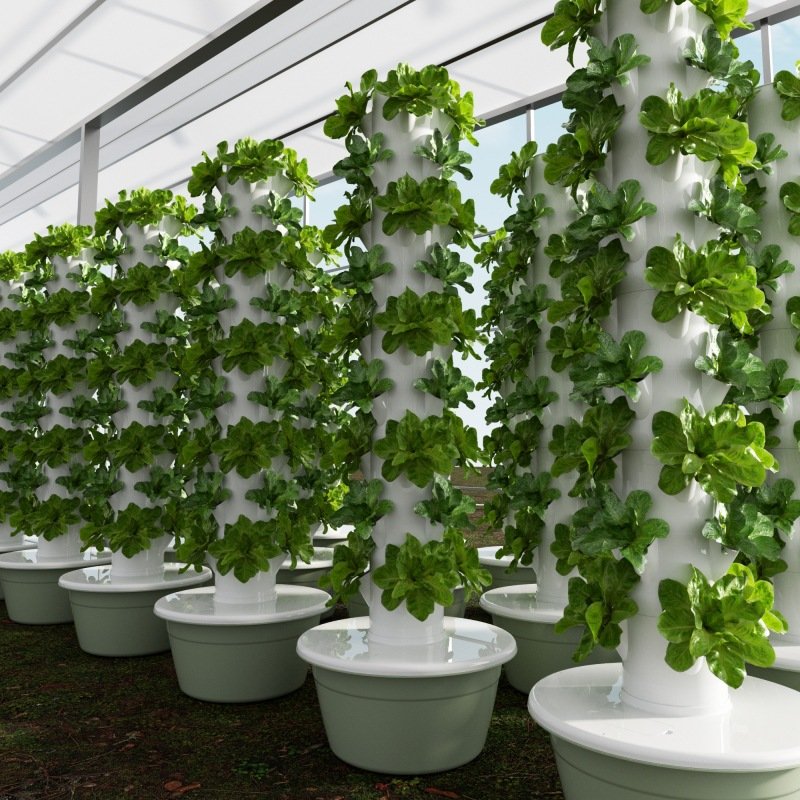Introduction
Tower hydroponics is a vertical soilless farming system that maximizes space efficiency while providing optimal growing conditions for vegetables. This innovative method offers numerous benefits over traditional farming and even conventional hydroponic setups. Below are the key advantages of using hydroponic towers for vegetable production.
1. Space Efficiency & High-Density Planting
- Vertical Design: Hydroponic towers grow plants upward, making them ideal for urban areas, small gardens, and indoor farming.
- More Plants per Square Foot: A single tower can hold 20–50 plants, compared to just a few in traditional soil beds.
- Perfect for Limited Spaces: Balconies, rooftops, and indoor settings can support multiple towers without requiring large plots of land.
2. Water Conservation
- Closed-Loop System: Recirculates water, reducing usage by up to 90% compared to soil farming.
- Minimal Evaporation: Since water is delivered directly to roots, less is lost to the environment.
- Sustainable Farming: Ideal for drought-prone regions where water scarcity is a concern.
3. Faster Growth & Higher Yields
- Optimal Nutrient Delivery: Plants receive a precise balance of nutrients 24/7, accelerating growth.
- Year-Round Production: Indoor towers with LED grow lights enable continuous harvests regardless of season.
- Higher Productivity: Some leafy greens (e.g., lettuce, kale) mature 30–50% faster than in soil.
4. Reduced Pest & Disease Risks
- No Soil = Fewer Pathogens: Eliminates soil-borne diseases (e.g., root rot, fungal infections).
- Controlled Environment: Indoor towers minimize exposure to pests like slugs, caterpillars, and weeds.
- Lower Need for Pesticides: Results in cleaner, organic produce.
5. Easy Maintenance & Automation
- Minimal Weeding: No soil means no weeds, saving labor.
- Automated Systems: Many hydroponic towers feature:
- Timed nutrient pumps
- pH & EC monitoring
- Self-watering mechanisms
- Low Physical Strain: No bending or tilling required, making it accessible for all ages.
6. Better Nutrient Control & Healthier Plants
- Customizable Nutrient Solutions: Adjustable formulas for different growth stages (seedling, vegetative, fruiting).
- Consistent Quality: Vegetables often have higher vitamin and mineral content due to optimized nutrition.
- No Heavy Metal Contamination: Avoids pollutants sometimes found in soil.
7. Versatility in Crop Selection
Tower hydroponics supports a wide variety of vegetables, including:
✅ Leafy Greens (Lettuce, Spinach, Kale)
✅ Herbs (Basil, Mint, Cilantro)
✅ Fruiting Plants (Cherry Tomatoes, Peppers, Strawberries)
✅ Microgreens & Sprouts
8. Eco-Friendly & Sustainable
- Reduces Carbon Footprint: Local production cuts down on transportation emissions.
- Less Land Degradation: No soil erosion or over-farming issues.
- Recyclable Materials: Many towers are made from durable, reusable plastics or food-grade PVC.
Conclusion
Tower hydroponics revolutionizes vegetable farming by maximizing space, saving water, increasing yields, and reducing labor. Whether for home growers, urban farmers, or commercial producers, this system offers a sustainable, efficient, and high-yielding alternative to traditional agriculture.
